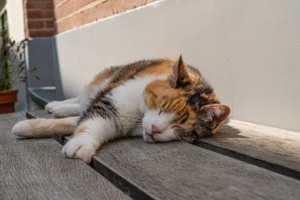Have you ever noticed your cat trembling or shivering for no apparent reason? It can be concerning to see your feline friend exhibit this behavior. In this blog post, we will explore the reasons why your cat may feel like he’s shivering and what you can do to help.
Understanding the Behavior
Have you ever noticed your cat shivering and wondered why? Well, there are a few common reasons that could be causing this behavior. One possibility is that your cat might be feeling cold, just like we do when we shiver in chilly weather. Cats can also tremble due to fear or anxiety, especially in new or stressful situations. Additionally, shivering could be a sign that your furry friend is experiencing pain or discomfort. Lastly, potential health issues, such as fever or neurological problems, could also be behind your cat’s shivering episodes. It’s essential to pay attention to these potential causes to better understand and address your cat’s needs.
Signs to Watch For
When your cat is shivering, it’s not just the physical tremors you should be mindful of. Keep an eye out for changes in behavior, such as increased hiding or decreased appetite, as these could indicate underlying issues. Also, observe any alterations in your cat’s physical appearance, like changes in coat condition or mobility. Vocalizations can also offer clues – if your cat is meowing more or differently than usual, it might be trying to communicate something. By watching for these signs and symptoms, you can better assess your cat’s well-being and take appropriate action if needed.
- Excessive grooming or lack of grooming
- Loss of coordination or balance
- Changes in litter box habits
Remember, your cat’s well-being is a top priority, so don’t hesitate to seek veterinary advice if you notice concerning signs or if your cat’s shivering persists. And always provide a cozy, warm environment to help your furry friend feel more comfortable and secure.
Environmental Factors
Have you ever noticed your cat feeling like he’s shivering? Well, it could be due to various environmental factors impacting their body temperature. If your furry friend is sitting in a drafty area or near a cold window, they might start shivering to generate heat. Ensure your cat has a warm and cozy spot to relax in, away from cold drafts, to help them feel more comfortable and reduce shivering episodes. Additionally, if the weather suddenly turns chilly, consider providing extra blankets or a heated bed for your cat to snuggle in and stay warm.
Stress and Anxiety
Stress and anxiety can also play a role in why your cat might feel like he’s shivering. Cats are sensitive creatures and can experience physical symptoms like shivering when they are feeling stressed or anxious. To help alleviate these issues, create a calm and soothing environment for your cat. Provide hiding spots, interactive toys, and reassuring cuddles to help your furry friend feel safe and secure. If the shivering persists, consider consulting with a veterinarian to rule out any underlying health concerns.
Additional Unique Insight:
Did you know that changes in routine or the introduction of a new pet or family member can also trigger stress and anxiety in cats, leading to shivering? Make sure to gradually introduce any changes and provide plenty of positive reinforcement to help your cat adjust smoothly.
Health Concerns
If your cat feels like he’s shivering, it could be a sign of underlying health issues. Metabolic disorders, neurological conditions, or pain from injuries could be the culprits. It’s essential to observe your cat’s behavior closely and consult with a veterinarian to rule out any serious health concerns. Remember, early detection is key in addressing health issues effectively and improving your cat’s well-being.
Providing Comfort
When your cat is shivering, creating a cozy environment can help provide comfort and support. Ensure your cat has access to warm bedding, a quiet space to relax, and plenty of fresh water. If your cat’s shivering persists or is accompanied by other concerning symptoms, it’s crucial to seek veterinary care promptly. Remember, your cat’s well-being should always come first.
- Limit Exposure to Cold: Keep your cat warm by avoiding drafts and ensuring they have a cozy spot to snuggle up.
- Gentle Petting: Providing gentle pets and soothing words can help calm your shivering cat and make them feel secure.
- Consult a Veterinarian: If your cat’s shivering continues or worsens, don’t hesitate to seek professional veterinary guidance. They can identify any underlying health issues and provide appropriate treatment.
Remember, your furry friend relies on you to take care of their health and well-being. By being attentive to their needs and providing a comfortable environment, you can help your cat feel safe and secure.
Why Does My Cat Feel Like He’s Shivering?
If your furry friend seems to be shivering, it could be a sign that something is amiss. While an occasional shiver could be due to excitement or a slight chill, persistent shivering may indicate an underlying health issue. Factors such as anxiety, fear, pain, or even fever could be causing your cat to shiver. Additionally, if your cat is malnourished or dehydrated, it may also experience tremors.
To better understand why your cat is shivering, it’s crucial to observe any accompanying symptoms and consult with a veterinarian. By paying attention to your cat’s behavior and seeking professional advice, you can ensure that your beloved pet receives the care and attention it needs.
Conclusion: Showing Care and Concern
Your cat’s well-being is a top priority, and it’s essential to address any concerning signs promptly. By staying attuned to your cat’s behavior and being proactive in seeking veterinary care, you demonstrate care and concern for your feline companion. Remember, your cat relies on you to advocate for its health and happiness, so don’t hesitate to take action if you notice any unusual symptoms. Show your cat the love and attention it deserves by being a vigilant and caring pet parent.
- Monitor your cat’s behavior closely for any changes or unusual symptoms.
- Consult with a veterinarian if you notice persistent shivering or any other concerning signs.
- Provide your cat with a warm and comfortable environment to help alleviate any potential causes of shivering.
- Ensure your cat has access to fresh water and a balanced diet to maintain overall health and well-being.
- Show your cat love and affection to help reduce stress and anxiety, which could contribute to shivering episodes.
Remember, your cat’s health is in your hands, so be proactive and attentive to ensure a happy and healthy life for your feline friend.
Alex, a passionate animal lover, has experience in training and understanding animal behavior. As a proud pet parent to two dogs and three cats, he founded AnimalReport.net to share insights from animal experts and expand his knowledge of the animal kingdom.




